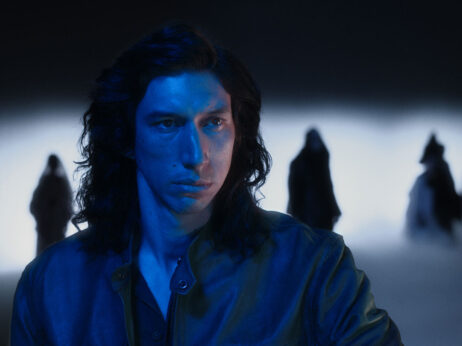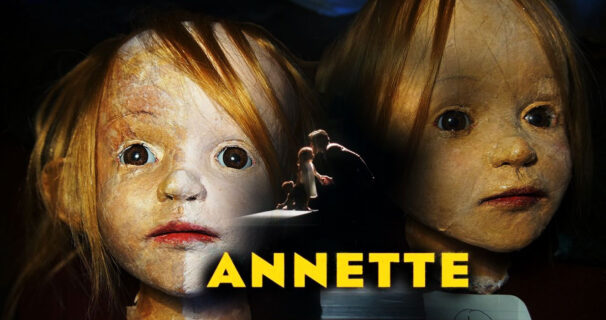
The musical drama Annette has something to say. There are messages to be found in the feverish journey viewers will find themselves on as they take in the eclectic sights and sounds of this rock opera. The issue is that those messages, and even a linear story, get lost a number of times within the exuberant spectacle of the film. Perhaps trying to decipher the logic of the plot in the midst of the absurdist happenings on screen is a metaphor for how we as a society try to make sense of our reality in the overstimulation of the modern digital age. This reviewer would like to think so because something profound seems to be happening in this movie, it just may be debatable as to what exactly.
The film’s story and music were written by Ron and Russell Mael of the band Sparks, with lyrics co-written by Leos Carax. This bit of information may give better insight into what viewers are in for when watching Annette. The Mael brothers are known for their art pop and theatrical sound. Their musical careers span close to 50 years, and they are often cited as being the inspiration for famous alternative, quirky, and bizarre musical acts that have come after them. The music and characters within this film hold true to this style as well.

Annette focuses on the relationship between provocative stand-up comedian Henry McHenry (Adam Driver) and world-famous opera singer Ann Desfranoux (Marion Cotillard). The fictional superstar couple has a passionate and swift courtship, resulting in Ann giving birth to their daughter Annette, who is portrayed by a wooden marionette puppet. The marriage becomes rocky when Henry’s career takes a downturn while Ann’s flourishes. Henry and Ann’s relationship doesn’t play like an intimate portrait of two unique characters, but rather symbolism for the world of celebrity culture they find themselves in and the trappings of trying to find purpose. Deep character exposés are not what you will get here, but rather wide strokes of what these characters represent.
There are things to love about the musical. Driver shines as McHenry, as his mental spiral drives the plot forward. McHenry seems to be a character inspired by the provocative performance artist Andy Kaufman, a popular and controversial comedian of the 1980s who described himself as the “anti-comedian.” His comedy was infamous for being alternative with the subversion of punchlines and traditional comedic style. He was also known for upsetting his audience on purpose. McHenry falls into this same category.
There’s something dark under McHenry’s surface. In one scene, he tells a questioning audience that his reason for pursuing a career in comedy is because he sees it as the only way to “tell the truth without being killed.” This in itself comes off as a commentary on how harsh facts are often sugarcoated in modern society. Driver plays this part hauntingly. This is important because most of the film is spent with him. His performance is powerful and stays with you long after the credits roll.
Then there are themes in the film that will encourage the viewer to ponder what is actually being said. The most obvious theme is the absurdity of celebrity culture. Celebrity culture is defined as being the high-volume exposure to the personal lives of celebrities on a global scale. This exposure is often tied to consumer interests, where famous people then use their fame to become product brands or sell products—or propaganda. It has also been seen as a way to distract working people from news and information that directly affect their lives.
It’s not hyperbole to say that there are many people who can name the last ex-boyfriend of reality television star Kim Kardashian but don’t know who their local congressperson is. Annette plays on this real-world absurdity, as Ann and Henry’s tumultuous union is highlighted in various tabloid cut scenes throughout the movie.
Both characters play as different sides of the coin that is celebrity in our society. Most celebrities, or influencers as they are called in the new digital age, are often attached to the ideas of individualism, fame, and fortune. Their personalities are not for themselves, but for the public to consume on a mass scale in order to be idolized, and for corporations to attach to in order to push propaganda or products. Ann is known as something of an opera princess, who is idolized for the way she can “die” on stage over and over again for the public to live through. She aims to please. Henry, meanwhile, is allowed to be provocative, but just until his act is deemed too probing and real for his audience to take in. They want him to make them laugh, not think.
Under capitalism, where there are those in power who would prefer an uninformed working class, the obsession with celebrities can serve as a powerful tool of distraction. Ann and Henry have real problems in the movie, but the world can’t see past the shallow gossip to recognize the danger.
 This is coupled with the choice the film makes to have the pair’s child be portrayed by a puppet. Perhaps it is a bit on the nose, as both Ann and Henry use their child as a means to their own ends, but the theme of exploitation is there as well. It may get missed unfortunately with viewers not being able to see past the fact that the child, Annette, is a cute doll, rather than why she is being seen as only a cute doll.
This is coupled with the choice the film makes to have the pair’s child be portrayed by a puppet. Perhaps it is a bit on the nose, as both Ann and Henry use their child as a means to their own ends, but the theme of exploitation is there as well. It may get missed unfortunately with viewers not being able to see past the fact that the child, Annette, is a cute doll, rather than why she is being seen as only a cute doll.
The movie poses a lot of questions and doesn’t exactly give you any answers. If you’re a fan of art pop and alternative music, you’ll enjoy the melodies. If you want a more traditional musical akin to Rodgers and Hammerstein’s The Sound of Music, however, you may find yourself disappointed, or utterly confused, at the choice of lyrics and placement of songs. With that said, Annette is not a musical that will be easily forgotten. Points are made, just not in a straight line.
Annette is currently streaming on Prime Video.










